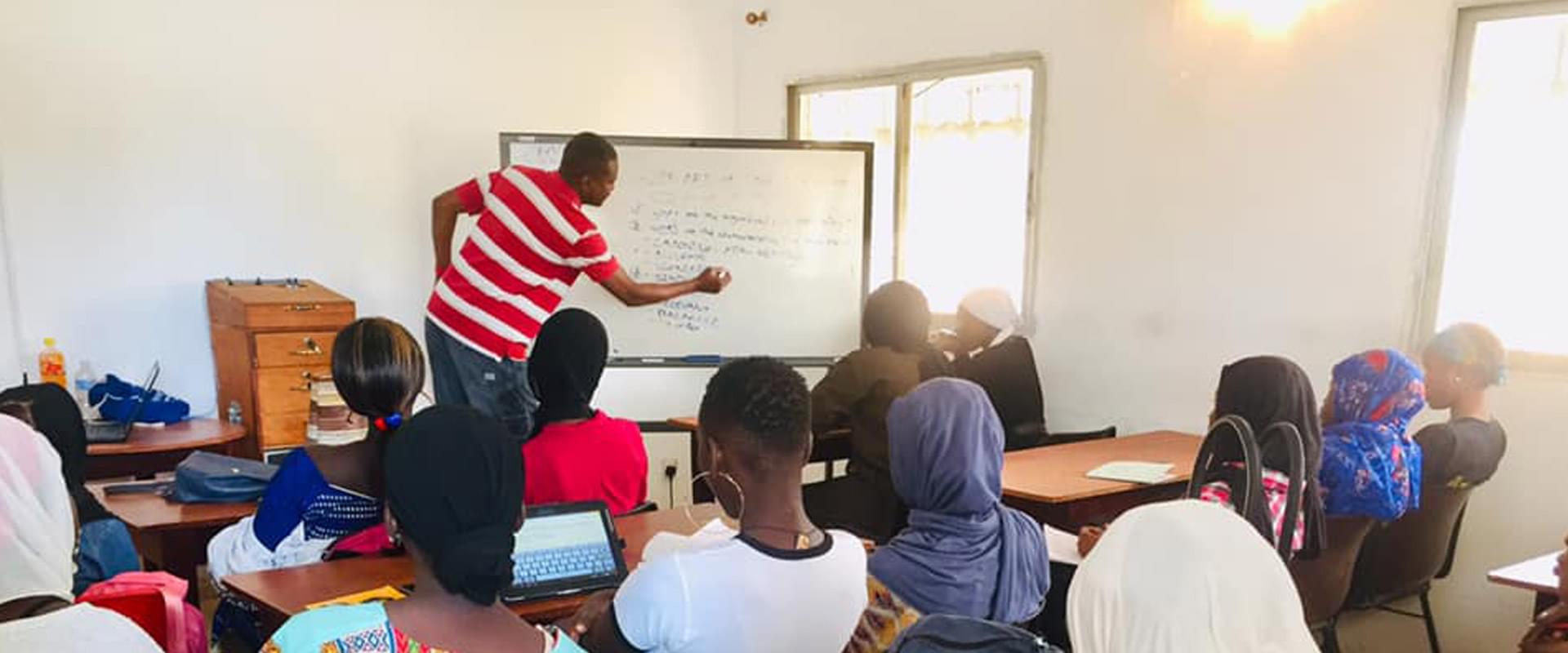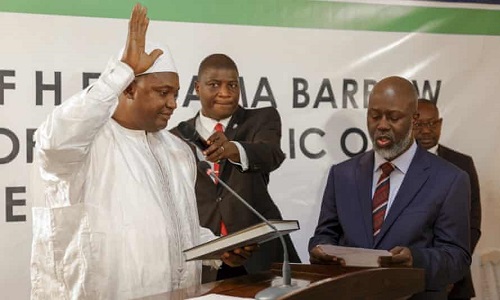
Feb 1, 2022 4:16 PM | Article By: Yankuba Jallow

President-elect, Adama Barrow being sworn-in at the Gambian Embassy in Dakar on 19th January 2017. (Photo: The Guardian)
In 2016, President Adama fled the country to Senegal where he took the oath of office because the environment was not conducive for his continued stay in the Gambia.
It was the first and only time that Gambians voted out a President through the ballot box.
There is a gap in the laws as it fails to capture how the government would transition from one regime to another as well as the protection of the incoming president. There was no handing over from former President Jammeh to President Barrow because the former was using State security.
Both the Gambian Constitution and the Elections Act provide no specific provisions that oblige the State security apparatus to provide protection for an incoming president elected under an opposition party or independent candidate ticket.
This poses a significant threat to the elected leader and the immediate family members, as they are left unprotected until their inauguration.
Security threat underestimated
In 2016, President-elect Adama Barrow (as he was then), was forced to hire private security guards from Senegal to protect him in addition to the civilian volunteers who sacrificed their lives to protect him. This was because he had no access to state security for protection. Barrow ended up taking refuge in Dakar for his safety, especially when his predecessor Yahya A.J.J Jammeh refused to relinquish power.
Citizens have since shown concern about this lacuna in the legal instruments and urge the authorities to enact laws that would oblige the state security forces to provide protection for the incoming president, especially when elected from the opposition parties or on an independent ticket.
Aminata Correa, a media assistant at the then Coalition 2016 Media Unit headquartered at the Kairaba Beach Hotel recalled the insecurities that surrounded the then President-elect, Adama Barrow. This was largely due to the fact that the people who volunteered to protect the president-elect were inexperienced in providing presidential security.
“The uncertainty at the time and the risk involved made it necessary for the President-elect to be given the security. I think we had underestimated how serious the threat was. Anything could have happened to the president-elect before he was flown out of the country,” she said.
Correa maintained that there is a need for a security sector reform that would take care of the lacuna, stating the experience in 2016 was a textbook description of how the former administration treated opponents.
Muhammed Joof was among the people who volunteered to guard Adama Barrow during the 2016 political impasse, following the presidential election. He endured attacks as he was allegedly stabbed by the supporters of ex-President Jammeh in Tallinding at night, while closing from his guard duty. Joof sustained injuries and he was threatened that he would be killed for serving as a close security protection personnel to the 2016 Coalition. The matter was reported at the Tallinding Police Station and the police command commissioned an investigation which found that Joof sustained injuries.
Absolute protection
The Deputy Party leader of the Gambia Democratic Congress (GDC) Amadou Kah, believes that the incoming president should be provided with “absolute protection” together with their immediate families. He said incoming presidents represent the will of the people – the verdict of the people, and that the position they are elected into represents democracy – “the survival of our democracy.”
“They should feel safe not only that they can trust, but also, they should feel safe that they will be able to assume the Office of President at the required time as mandated by the Constitution in peace and stability,” Kah said.
“Another important aspect here is not only about having a law providing a mechanism, but I think it is very fundamental that the institutions that are responsible for such protection to be educated, to be enlightened [and] to be strengthened. [We] need to build the institution in such a way that they would only serve the Constitution and the will of the people without affection or ill-will.”
The civil society leader Marr Nyang, said the best practice in a democratic society is when one is elected as a President, he or she receives security protection from the State.
“It is obligatory on the State to provide security protection for the president-elect.”
“Not only to receive security protection, but the president-elect should also receive security briefings from the heads of the security apparatuses that will also help the president-elect to acquaint him or herself with the security status of the country so that once the person assumes office, he or she can smoothly go through the transition.”’
Marr said the cabinet of the incoming president should receive briefing from the cabinet of the outgoing president so that the handing over and the transition could be done smoothly, suggesting security sector reform to accommodate such issues.
According to him, Barrow’s cabinet did not receive proper security briefing from their predecessor and they were not prepared to tackle the urgent security needs.
“There was no clear briefing from the outgoing cabinet to the incoming cabinet. There has to be a law that will govern the process and procedure of protecting the incoming president and his cabinet, sharing of the briefing regarding the security of the country and then also briefings from the outgoing cabinet to the incoming cabinet.”
“Those issues should be clearly laid out in our laws,” he said.
A young politician, Kemeseng Sanneh, has also discussed the need for the reforms to create protection for the incoming presidents from the opposition. “I strongly recommend legislation to that effect.”
He recalled that Adama Barrow took his oath of office in Senegal because the environment was not ripe for him to take it in The Gambia.
“We cannot continue to have our incoming president take his or her oath of office in another country. He or she should be protected, to ensure that the verdict of the people prevail. The situation in 2016, which compelled the President to flee out of the country, should not repeat. Thus, the need for legislative reform,” he said.
Extremely important
Meanwhile, a lawmaker, Suwaibou Touray, has agreed with the call.
“For the interest of peaceful and lawful transfer of power, I believe it is ‘extremely important’ and wise to safeguard the security of our leaders as well as ensuring that our electoral process is sustained and predictable,” Touray said.
However, lawyer Abdoulie Fatty said he is not sure whether there is a need for a special legislation to deal with the matter.
He said what happened during the reign of former President Jammeh was atrocious and abnormal.
He cited the December 4, 2021 presidential elections where the police provided all the candidates protection during the campaign period.
“That's the duty of the police and even the NIA,” he said, adding, “Jammeh just monopolised those institutions.”
Lawyer Fatty said if President Barrow had lost last year’s election, “I am sure the police would have enhanced protection for them befitting a President-elect and being equally entitled to intelligence briefings.”
He added: “I do not personally think we need special legislation to address this issue. What we need is strong justice sector institutions such as the police.”
He said in both the UK and the Unites States of America, the leading opposition candidate is briefed by security chiefs just in case he or she wins they would have had a reasonable idea of the state of the country's intelligence.
“Again, a president-elect is a president in waiting. Therefore, he or she is entitled to enhanced security to protect him or her and should also be entitled to a lot of the benefits that the incumbent is entitled to in terms of access to state facilities,” Fatty said.
“I mean meetings with the Inspector General of Police, Chief of Defence Staff, National Intelligence Agency director, so that as soon as he or she is sworn in, they would have had some knowledge of the state of affairs.”
Comments (0)
0 Likes
Leave your thought here
Your email address will not be published. Required fields are marked *